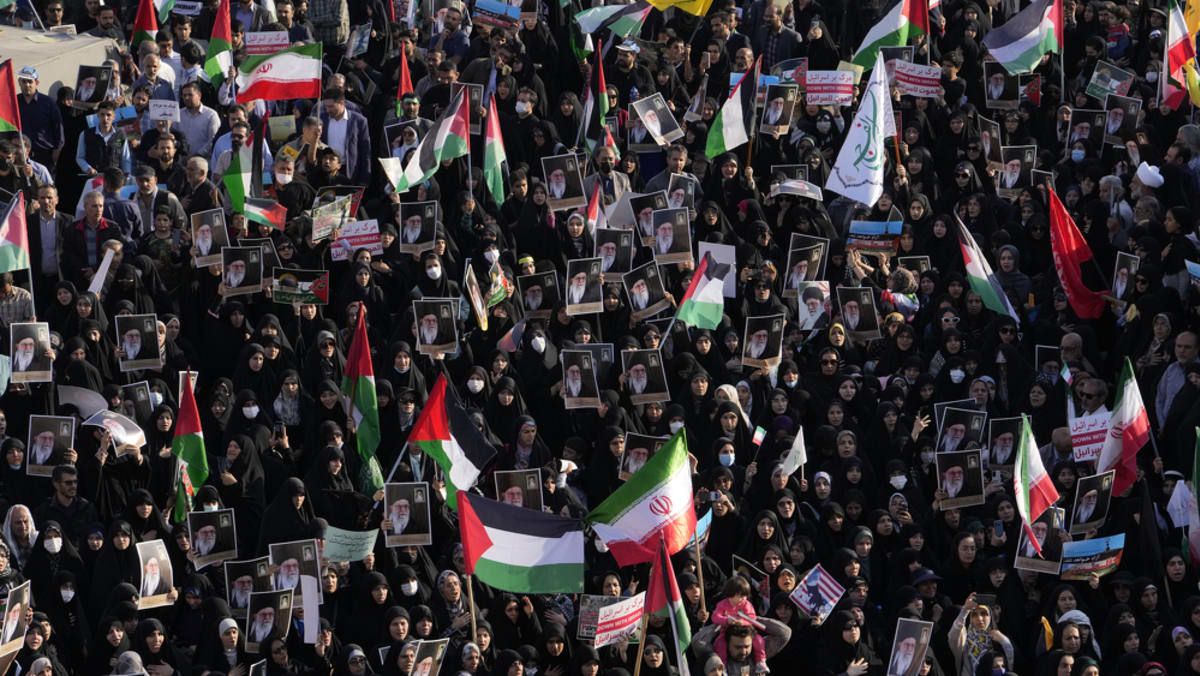MELBOURNE: Iran has warned Israel of severe consequences from “multiple fronts” if it does not halt its relentless bombardment of the Gaza Strip. This warning is widely interpreted as a declaration of intent for Iran to enter the conflict via its allies and proxies.
The Hezbollah militant group, which is already engaged in low-level skirmishes across the Israeli border with Lebanon, and the Assad regime in Syria are both closely aligned with Iran. Given Iran’s increasingly hostile rhetoric, Washington and Tel Aviv have been deliberating over what to do if and when Tehran gives the order to engage.
Israel’s position on Iran has been uncompromising. In the past, it has advocated for surgical strikes on Iranian nuclear facilities and has been implicated in the assassination of Iranian nuclear scientists.
Iran’s potential entry into the Israel-Hamas war in Gaza would open a new chapter in hostilities between the enemies – and take the war directly to Iran’s doorstep.
MILITARY AND POLITICAL REPERCUSSIONS
Despite its warnings to Israel, Iran appears reluctant to take the route of directly entering the conflict for fear of risking a harsh Israeli response.
As a result, Iran has been maintaining a difficult balance between its ideological rhetoric and political expediency. But Iran is playing with fire. The balance it seeks to maintain can be easily disrupted in the unpredictable fog of war.
Tehran’s official line is extreme. It denies Israel the right to exist, and refers to it not as a state, but as a Zionist entity. Iranian official declarations are replete with anti-Israel tirades.
In June, Tehran unveiled its latest missile and boasted that it had the range to reach Israel. Banners announcing the missile had the words “400 seconds to Tel Aviv” printed in Persian, Hebrew and Arabic.
This message is integral to the ideology of the ruling regime and a rallying cry for its supporters.
Anti-Israel and anti-US venom is a staple of political discourse for the hardline faction that governs Iran under Supreme Leader Ali Khamenei and President Ebrahim Raisi. This faction is bolstered by its control of the judiciary, the parliament and the Islamic Revolutionary Guard Corps.
In fact, there are now calls from the hardline camp to follow through with the promise of destroying Israel. The editor-in-chief of Kayhan Daily, known as the mouthpiece of Khamenei, has called for an official declaration of war against Israel.
However, the authorities do not have a death wish.
Related:
Commentary: Why Hamas' deadly surprise attack on Israel matters to Singapore
Commentary: Pause on Israel diplomatic deal will buy Saudi Arabia time for plan to ‘de-risk’ Middle East
They are fully aware that open confrontation with Israel – or even a confrontation by one of Iran’s proxies – could be very costly for Iran. Not only could there be an Israeli military retaliation on Iranian facilities, but also political repercussions for a regime increasingly unpopular with its own citizens.
The Iranian public is disillusioned with the regime’s ideological zeal against Israel and sees it as a ploy to hide corruption, economic woes and the inability of the government to provide for its citizens.
The chant often heard at protests over the past decade – “Neither Gaza nor Lebanon, I sacrifice my life for Iran” – is a vivid reminder of the gap between the ruling regime and the population.
Widespread protests across Iran following the killing of Mahsa Amini have shown the depth of regime’s unpopularity in the past year. Given this, a military confrontation with Israel could have unpredictable political consequences for the regime.
A HOSTAGE OF ITS OWN RHETORIC
The ruling regime in Iran has been mindful of US and Israeli red lines to avoid open hostilities.
After the US assassination of celebrated war hero Qassem Soleimani in January 2020, for example, Iranian authorities were enraged and promised “harsh retaliation”. But the response was relatively meek: A pre-warned strike on two Iraqi airfields that housed US troops.




